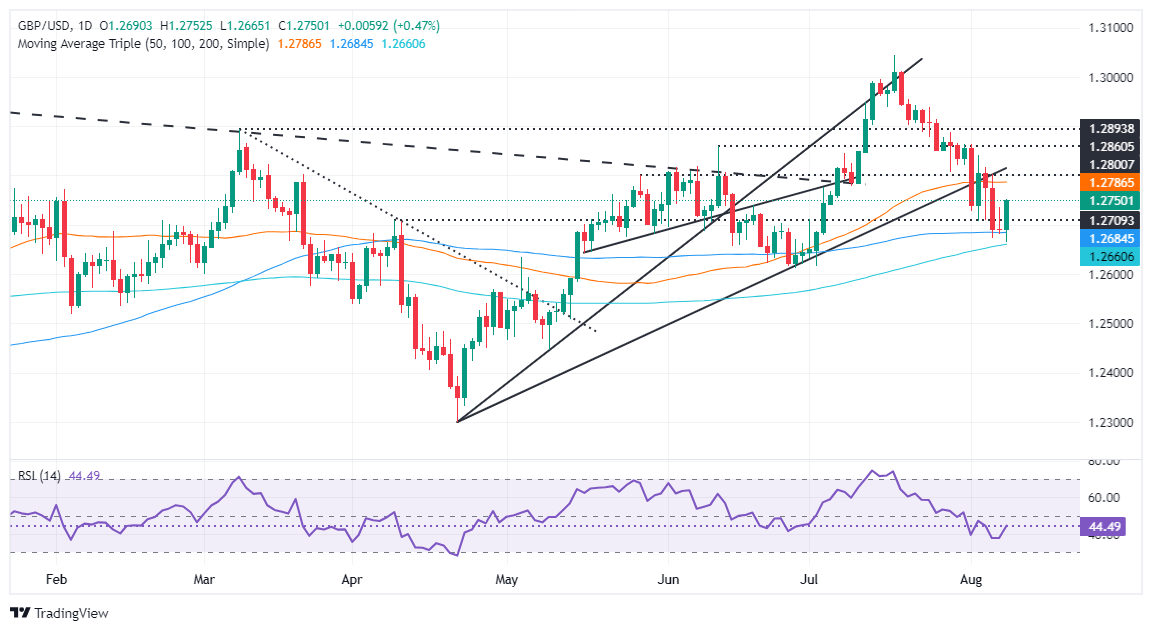- Analytics
- News and Tools
- Market News
- GBP/USD Price Forecast: Rebounds at around 200-DMA, climbs above 1.2700
GBP/USD Price Forecast: Rebounds at around 200-DMA, climbs above 1.2700
- Pound Sterling surges 0.40% after bouncing off weekly lows near 1.2654.
- RSI indicates upward momentum, with buyers aiming for 1.2785 and 1.2800.
- A drop below 1.2700 could test 100 and 200-DMAs, leading to 1.2600.
The Pound Sterling made a U-turn and surged during the North American session after falling shy of testing the 200-day moving average (DMA) at 1.2654, yet buyers stepped in and lifted the GBP/USD pair. At the time of writing, the major trades at 1.2744 gaining over 0.40%.
GBP/USD Price Forecast: Technical outlook
The GBP/USD bounced off the weekly lows, yet it’s not out of the woods. Momentum remains in the seller’s favor, but in the near term, buyers are in charge. The Relative Strength Index (RSI) remains below the 50-neutral line, but it’s aiming upwards.
For a bullish resumption, buyers need to reclaim the 50-DMA at 1.2785, followed by the 1.2800 figure. Once surpassed, the next stop would be the July 29 peak at 1.2888 before challenging 1.2900.
Conversely, and the path of least resistance, if sellers drag the exchange rate underneath 1.2700, this could exacerbate a test of the 100 and 200-DMAs, each at 1.2683 and 1.2654, respectively. On further weakness, the next stop would be the 1.2600 psychological figure.
GBP/USD Price Action – Daily Chart
Pound Sterling FAQs
The Pound Sterling (GBP) is the oldest currency in the world (886 AD) and the official currency of the United Kingdom. It is the fourth most traded unit for foreign exchange (FX) in the world, accounting for 12% of all transactions, averaging $630 billion a day, according to 2022 data. Its key trading pairs are GBP/USD, aka ‘Cable’, which accounts for 11% of FX, GBP/JPY, or the ‘Dragon’ as it is known by traders (3%), and EUR/GBP (2%). The Pound Sterling is issued by the Bank of England (BoE).
The single most important factor influencing the value of the Pound Sterling is monetary policy decided by the Bank of England. The BoE bases its decisions on whether it has achieved its primary goal of “price stability” – a steady inflation rate of around 2%. Its primary tool for achieving this is the adjustment of interest rates. When inflation is too high, the BoE will try to rein it in by raising interest rates, making it more expensive for people and businesses to access credit. This is generally positive for GBP, as higher interest rates make the UK a more attractive place for global investors to park their money. When inflation falls too low it is a sign economic growth is slowing. In this scenario, the BoE will consider lowering interest rates to cheapen credit so businesses will borrow more to invest in growth-generating projects.
Data releases gauge the health of the economy and can impact the value of the Pound Sterling. Indicators such as GDP, Manufacturing and Services PMIs, and employment can all influence the direction of the GBP. A strong economy is good for Sterling. Not only does it attract more foreign investment but it may encourage the BoE to put up interest rates, which will directly strengthen GBP. Otherwise, if economic data is weak, the Pound Sterling is likely to fall.
Another significant data release for the Pound Sterling is the Trade Balance. This indicator measures the difference between what a country earns from its exports and what it spends on imports over a given period. If a country produces highly sought-after exports, its currency will benefit purely from the extra demand created from foreign buyers seeking to purchase these goods. Therefore, a positive net Trade Balance strengthens a currency and vice versa for a negative balance.
© 2000-2026. All rights reserved.
This site is managed by Teletrade D.J. LLC 2351 LLC 2022 (Euro House, Richmond Hill Road, Kingstown, VC0100, St. Vincent and the Grenadines).
The information on this website is for informational purposes only and does not constitute any investment advice.
The company does not serve or provide services to customers who are residents of the US, Canada, Iran, The Democratic People's Republic of Korea, Yemen and FATF blacklisted countries.
Making transactions on financial markets with marginal financial instruments opens up wide possibilities and allows investors who are willing to take risks to earn high profits, carrying a potentially high risk of losses at the same time. Therefore you should responsibly approach the issue of choosing the appropriate investment strategy, taking the available resources into account, before starting trading.
Use of the information: full or partial use of materials from this website must always be referenced to TeleTrade as the source of information. Use of the materials on the Internet must be accompanied by a hyperlink to teletrade.org. Automatic import of materials and information from this website is prohibited.
Please contact our PR department if you have any questions or need assistance at pr@teletrade.global.
















